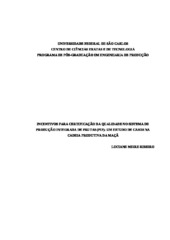Incentivos para a certificação da qualidade no sistema de produção integrada de frutas (PIF): um estudo de casos na cadeia produtiva da maça.
Abstract
With the increase of the consumed volume of products as of FLG (fruits, vegetables and greens), both fruits farmers and processors it has looked for mechanisms that promote the
product differentiation, conferring attributes of both quality and security food and the productive process. Certified of the fruit quality with international acceptance are an alternative for the farmers and processors fruits to break non-tariff barriers imposed by import markets and to increase the competitiveness of the businesses. It enters the some
available quality certifications in the market fruits is the Integrated Fruits Production (IFP), legalized in Brazil initially in apple production. The objective of this research is to analyze
the causal incentives of the Integrated Apple Production (IAP) adoption for different agents of the both production and processing agricultural segment of the apple chain and explorer
the incentives that stimulate the agents to implant the IAP certification. The method choused as strategy for the development of the research was the study of cases in five
companies of São Joaquim (SC) that commercialize IAP certified fruits. The research concludes that the incentives to the implantation of the IAP certification are related, in part,
the necessity of the agents of the same segment, and with common interests to search the competitiveness adopting similar competitive strategies to those of the main competitors. However the incentives also are related to the force of some agents of the same segment with extended chain insertion acting in the production that transmit to the agents conditions of market demand yourself. Exactly not receiving incentives from price, the agents of the
both production and processing agricultural production find indirect benefits with the PIM, mainly in the agricultural production control activities.
